Sudanese Christian tradition deserves respect
There is a genuine Christian tradition in Southern Sudan that has sunk its roots into the lives of Sudanese people for over a century.
Christianity has gradually been inculturated into the traditional culture, indigenous religiosity and moral standards and into the vernacular of the people.
Christianity has its distinctive physiognomy in Sudan due to unique indigenous character of its people. This distinctive Sudanese life expression of Christianity must be jealously protected.
Of late, under the pretexts of redeeming Sudanese slaves, terminating hunger and war, or to explore more fully health conditions, several little-known foreign religious groups have collected large sums of money from their churches in western countries with which they have easily bought their way into Southern Sudan.
Once there, they lure the young and the old into their following with material goods which the southern Sudanese are desperately in need of.
Blankets, clothes, soap, salt, gold watches, earrings, bracelets, toys of all kinds, sweets and electronic items are all used as baits.
For the first time in my 19 years of service in Southern Sudan, on March 14, I found myself celebrating mass in a crowded catholic church with children caressing dolls, dropping rubber toys to the ground, stringing yoyos up and down and blowing bubbles of chewing gum right under my nose. Young girls wore the most elegant ornaments in their hair and costly earrings.
This made me ask my people as I held my large crucifix up high: “Did Jesus win you to himself with blankets, new clothes, soap, salt or many beautiful things such as watches, bracelets and toys? NO! He gave his very life on the Cross for you and me!''
I went on: “Know that your Bishop has a deep concern as your Christian Shepherd. You are allowing strangers to buy you away from your faith in the real Christ, the Son of God, with mere blankets, golden objects or amusing gadgets or toys. I beg you, my people, hold on to your greatest treasure, your faith!”
In the name of Ecumenism and sound Christianity, no foreign group that has inadequate knowledge of Christian living in Sudan should come and raid Christians away from their respective churches then abandon them.
It is an opportunistic approach in a time of abject poverty, hunger and never-ending war to come and weaken the time-tested Christian faith by offering what they most desperately need. This causes confusion to many of our Christians who may be weak in their faith.
These less-known groups divorce Christians away from a Christ-centered religion and instill into our naïve people the misconception that theirs (the less-known groups') is indeed the best solution out of their (Sudanese's) desperate situation.
This is desecration, contamination and institutionalised spiritual and moral confusion.
All of these pave the way for the simplistic acceptance of any religion. What these groups create is the best setting for non-Christians to buy confused and needy people away from us spiritually and morally in a country that is at war.
Some non-Christian religions have the richest and most abundant resources to buy out our Christians and there is no better time to do it than when our faithful are confused, mystified and desecrated from the true concept and vision of Christian religion.
There is an on-going reconciliation process alive in Southern Sudan to avert raiding and misappropriation between tribes. We must come to a climate of reconciliation among the traditional Christian churches of Sudan. More specifically, we must define our genuine Christian physiognomy as Sudanese Christians and prevent raids and contamination of this well-established image from any external forces.
We can't sit back and wait. The time is now, before the contamination spreads.
All Christian leaders in South Sudan must stand firm and support their flocks so that they are NOT derailed from their faith and then deserted. Let us teach, govern and sanctify Christians in Sudan with more church personnel who are dedicated to preserve the Christianity that has become typically traditional to the people.
The Sudanese beautiful physiognomy of Christianity cannot be manaced or disrespected by unenlightened foreign infiltration. Sudanese Christianity deserves respect!
Caesar Mazzolari
Bishop of Diocese Of Rumbek
Southern Sudan
----------------------------------------------------------------------
SUDAN CATHOLIC INFORMATION OFFICE
Bethany House, P. O. Box 21202, Nairobi, Kenya
tel. +254.2.562247 or 569130, fax 566668
e-mail: [email protected]
----------------------------------------------------------------------
For further information, please contact:
Fr. Kizito, SCIO, tel +254.2.562247 - fax +254.2.566668 - e-mail: 
